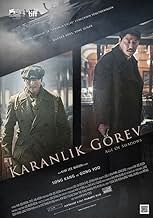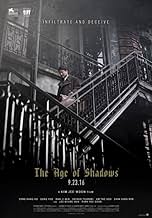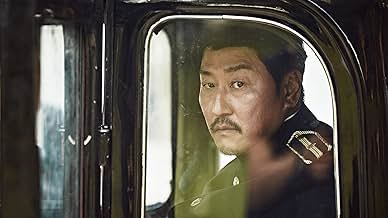Korean resistance fighters smuggle explosives to destroy facilities controlled by Japanese forces in this period action thriller.Korean resistance fighters smuggle explosives to destroy facilities controlled by Japanese forces in this period action thriller.Korean resistance fighters smuggle explosives to destroy facilities controlled by Japanese forces in this period action thriller.
- Director
- Writers
- Stars
- Awards
- 16 wins & 41 nominations total
- Director
- Writers
- All cast & crew
- Production, box office & more at IMDbPro
Featured reviews
* This was South Korea's official submission for the Best Foreign Language Oscar of 2016. There were four, notable SK movies released in 2016 and this movie was the one officials felt was the best to submit....boy were they wrong. Both "The Handmaiden" and "The Wailing" are simply superior in just about every reguard.
* The movie is not bad by any measure, it's technical merits (cinematography, acting, production design, etc) are all great. The movie has a great stoic, 1920s feeling to it. And Song Kang-ho is outstanding (no surprise here). This was clearly well planned and organized by top workers in SK. It just didn't have a strong story behind all the great acting and camera-work.
* It's the story that feels just a tad underwhelming. It ends up going exactly where you expect it to (with a few MINOR surprises along the way). But right from the get go, you know where this one is heading. And it's this predictability and makes the 2 hours and 15 minutes feel a bit long.
* When all's said and done, this is a good movie from South Korea, but not great. It's not among the all time greats (and boy there are a lot), and it's not even the best movie from South Korea in 2016. But if you are a fan of period dramas (this one is light on action), then this is something you should check out.
* The movie is not bad by any measure, it's technical merits (cinematography, acting, production design, etc) are all great. The movie has a great stoic, 1920s feeling to it. And Song Kang-ho is outstanding (no surprise here). This was clearly well planned and organized by top workers in SK. It just didn't have a strong story behind all the great acting and camera-work.
* It's the story that feels just a tad underwhelming. It ends up going exactly where you expect it to (with a few MINOR surprises along the way). But right from the get go, you know where this one is heading. And it's this predictability and makes the 2 hours and 15 minutes feel a bit long.
* When all's said and done, this is a good movie from South Korea, but not great. It's not among the all time greats (and boy there are a lot), and it's not even the best movie from South Korea in 2016. But if you are a fan of period dramas (this one is light on action), then this is something you should check out.
This film has strong commercial potential because of its suspenseful narrative structure; the bravado cinematography and editing; the strong acting; the powerfully evocative production design; and the effective musical score. Loved the entire look of the film. Love the sepia tone, the 1920s period costumes and sets, the compelling storyline, and the circularity of the narrative structure. To me, the strongest storytellers working today in cinema are from Asia, and that makes me so very happy as Asian cinema has lost a lot of its standing in World Cinema without the post-War (II) Japanese masters.
Score Grid (out of 4)
Script/Story: 4
Cinematography/Visual Effect: 4+
Editing: 4
Sound/Musical Score: 4
Production Design: 4+
Acting/Performance: 4
Recommend the film? Absolutely. This foreign film has the appeal of today's Hollywood products: the action, suspense, music, etc. The operatic concluding scene -- underscored by Ravel's Bolero -- owes so much to both Scorsese and FFCoppola. Also to Andrze Wajda really in look and feel; wonder if Kim Jee-woon is familiar with the Polish master's work?
Thumbs way up!
Score Grid (out of 4)
Script/Story: 4
Cinematography/Visual Effect: 4+
Editing: 4
Sound/Musical Score: 4
Production Design: 4+
Acting/Performance: 4
Recommend the film? Absolutely. This foreign film has the appeal of today's Hollywood products: the action, suspense, music, etc. The operatic concluding scene -- underscored by Ravel's Bolero -- owes so much to both Scorsese and FFCoppola. Also to Andrze Wajda really in look and feel; wonder if Kim Jee-woon is familiar with the Polish master's work?
Thumbs way up!
Well, that was a lot of fun. The Age of Shadows is a spy thriller that is basically a ticking bomb and once things go wrong, it just gets brutal and chaotic. The set up for these characters and their plot is well put together enough to be engrossing. And the set pieces are just excitingly executed. The film is unafraid of showing something terrible from their consequences. Though there is one point at the third act where I wished the film had ended. It gets to feel a little too long as it goes on, but man, the train sequence alone is one hell of an exercise for suspense. The production is also too impressive and the acting is quite engaging. Overall, it's a dark and brutal, yet quite an edge of your seat cinematic thrill ride.
"The Age of Shadows" is a historically inspired dramatic action-thriller about a group of Korean resistance fighters who are opposing the peninsula's Japanese occupation. Directed and written by creative mastermind Kim Jee-won and starring South Korean top actors like Lee Byung-hun, this epic film became South Korea's official submission for the "Best Foreign Language Film" category of the 89th Academy Awards in 2017. While the premises seemed to be very positive, I was slightly disappointed by the movie.
First of all, a much better movie with a very similar story line called "Assassination" was released only one year earlier and it beats this flick in terms of acting, pace, settings and story. It's quite difficult to identify with the main character in "The Age of Shadow" who constantly changes sides and doesn't seem to know what he believes in. Instead of portraying a man torn between two choices, the movie focuses on a rather antipathic and egoistic character who is thinking about his own advantage at all times. Even an outstanding actor like Song Kang-ho can't make this dull main character any more exciting.
"The Age of Shadow" starts with an explosive opening scene only to lead towards a lengthy introduction with endless dialogues and numerous characters. It takes close to one hour before the pace quickens up again. The first half of the movie is definitely too long and often lost my interest.
While the settings of the movie are very realistic and bring to life a genuine depiction of the Korean peninsula in the forties, the costumes and locations aren't as detailed and memorable as in many other South Korean high-quality productions.
The story remains somewhat shallow in my opinion. It's obvious that the members of the resistance are trying to attack the Japanese occupants but the film never really explains what they are organizing precisely. It's quite unsatisfying to realize that the resistance's charismatic leader is taking many risks by trusting a highly unreliable main character and personally organizing an attack against the enemy that is never ever specified. The ending also leaves many questions open and feels unfinished to me.
Despite these flaws, the movie also has many strong points. The side characters are portrayed excellently and add some depth to the movie. Especially the clever villain portrayed by Um Tae-goo is very creepy. The movie also convinces in its more intense passages. The opening scene is both dynamic and memorable. The climax on the train is very tense and will get you on the edge of your seat. The last thirty minutes of the film have a welcome dramatic and emotional touch. The settings are authentic and especially the scenes on the train, in different torture chambers and in the prison are beautifully crafted and provide a gripping and sinister atmosphere. While the story is maybe the movie's biggest flaw, it still requests some thinking from the audience and includes a few minor twists in the second half of the film that save this movie for me.
Maybe my rating would be slightly more generous if the excellent "Assassination" hadn't been released a year earlier. That film's excellent execution from any point of view makes "The Age of Shadows" look quite predictable, redundant and even unnecessary. Faithful fans of contemporary South Korean cinema should still watch both movies but I would only recommend "Assassination" to occasional international audiences. "The Age of Shadows" really pales in comparison to Choi Dong-hoon's "Assassination". On a closing note, South Korea should have chosen the outstanding horror film "The Wailing" as official submission for the "Best Foreign Language Film" category of the 89th Academy Awards in 2017.
First of all, a much better movie with a very similar story line called "Assassination" was released only one year earlier and it beats this flick in terms of acting, pace, settings and story. It's quite difficult to identify with the main character in "The Age of Shadow" who constantly changes sides and doesn't seem to know what he believes in. Instead of portraying a man torn between two choices, the movie focuses on a rather antipathic and egoistic character who is thinking about his own advantage at all times. Even an outstanding actor like Song Kang-ho can't make this dull main character any more exciting.
"The Age of Shadow" starts with an explosive opening scene only to lead towards a lengthy introduction with endless dialogues and numerous characters. It takes close to one hour before the pace quickens up again. The first half of the movie is definitely too long and often lost my interest.
While the settings of the movie are very realistic and bring to life a genuine depiction of the Korean peninsula in the forties, the costumes and locations aren't as detailed and memorable as in many other South Korean high-quality productions.
The story remains somewhat shallow in my opinion. It's obvious that the members of the resistance are trying to attack the Japanese occupants but the film never really explains what they are organizing precisely. It's quite unsatisfying to realize that the resistance's charismatic leader is taking many risks by trusting a highly unreliable main character and personally organizing an attack against the enemy that is never ever specified. The ending also leaves many questions open and feels unfinished to me.
Despite these flaws, the movie also has many strong points. The side characters are portrayed excellently and add some depth to the movie. Especially the clever villain portrayed by Um Tae-goo is very creepy. The movie also convinces in its more intense passages. The opening scene is both dynamic and memorable. The climax on the train is very tense and will get you on the edge of your seat. The last thirty minutes of the film have a welcome dramatic and emotional touch. The settings are authentic and especially the scenes on the train, in different torture chambers and in the prison are beautifully crafted and provide a gripping and sinister atmosphere. While the story is maybe the movie's biggest flaw, it still requests some thinking from the audience and includes a few minor twists in the second half of the film that save this movie for me.
Maybe my rating would be slightly more generous if the excellent "Assassination" hadn't been released a year earlier. That film's excellent execution from any point of view makes "The Age of Shadows" look quite predictable, redundant and even unnecessary. Faithful fans of contemporary South Korean cinema should still watch both movies but I would only recommend "Assassination" to occasional international audiences. "The Age of Shadows" really pales in comparison to Choi Dong-hoon's "Assassination". On a closing note, South Korea should have chosen the outstanding horror film "The Wailing" as official submission for the "Best Foreign Language Film" category of the 89th Academy Awards in 2017.
Mil Jeong (밀정 ~ The Age of Shadows).
Viewed at 2016 Venice FilmFestival. Tremendous Korean epochal drama about life and resistance under the oppressive Japanese occupation in the early decades of the century. Director Kim Jaewoon really knows how to set up drama and suspense mixed with blazing action. There was so much in this film that I felt like I was watching a Beethoven symphony. Dark Sepia toned photography used to good effect enhances period feel. Musical soundtrack employs jazz and adrenaline tensor stretches and the final shootout in the train station is orchestrated deftly to Ravel's Bolero.
139' running time is long and winds up with several anticlimactic codas but never lets you out if its grip. For Koreans this is clearly a film with heavy patriotic messages. The final theme is "Don't let your failures stop you -- build on them and rise to the next level" -- until victory is achieved. I would love to see this film with a Korean audience and would expect to see people on their feet cheering at the end... A young Italian I met afterwards said he loved it even though he knows nothing of the history involved. I could easily see why -- in a way this is something like a Kimchee spaghetti western and charismatic actor Kang-ho Song, 49, has got to be the Korean equivalent of John Wayne, or at least, Robert Mitchum.
Viewed at 2016 Venice FilmFestival. Tremendous Korean epochal drama about life and resistance under the oppressive Japanese occupation in the early decades of the century. Director Kim Jaewoon really knows how to set up drama and suspense mixed with blazing action. There was so much in this film that I felt like I was watching a Beethoven symphony. Dark Sepia toned photography used to good effect enhances period feel. Musical soundtrack employs jazz and adrenaline tensor stretches and the final shootout in the train station is orchestrated deftly to Ravel's Bolero.
139' running time is long and winds up with several anticlimactic codas but never lets you out if its grip. For Koreans this is clearly a film with heavy patriotic messages. The final theme is "Don't let your failures stop you -- build on them and rise to the next level" -- until victory is achieved. I would love to see this film with a Korean audience and would expect to see people on their feet cheering at the end... A young Italian I met afterwards said he loved it even though he knows nothing of the history involved. I could easily see why -- in a way this is something like a Kimchee spaghetti western and charismatic actor Kang-ho Song, 49, has got to be the Korean equivalent of John Wayne, or at least, Robert Mitchum.
Did you know
- TriviaThis film is Warner Bros. first Korean production.
- GoofsIn the train one of the resistance members open the pocket watch with QUARTZ inscription on dial. Second hand of the watch moves in distinct steps reaffirming they have a quartz movement inside. Quartz watch was not invented in 20s and was not available till late 60s.
- Quotes
Jung Chae-San: Even when we fail, we move forward. The failures accrue, and we tread on them to advance to higher ground.
- Crazy creditsThe Warner Bros logo is set on a quiet street.
- ConnectionsFeatured in Boléro, le refrain du monde (2019)
- SoundtracksWhen you're smiling
Written by Larry Shay (uncredited), Mark Fisher (uncredited) and Joe Goodwin (uncredited)
Performed by Louis Armstrong
- How long is The Age of Shadows?Powered by Alexa
Details
- Release date
- Countries of origin
- Official sites
- Languages
- Also known as
- Secret Agent
- Filming locations
- Production companies
- See more company credits at IMDbPro
Box office
- Budget
- $8,620,000 (estimated)
- Gross US & Canada
- $541,719
- Opening weekend US & Canada
- $165,685
- Sep 25, 2016
- Gross worldwide
- $54,491,162
- Runtime
- 2h 20m(140 min)
- Color
- Sound mix
- Aspect ratio
- 2.39 : 1
Contribute to this page
Suggest an edit or add missing content






































